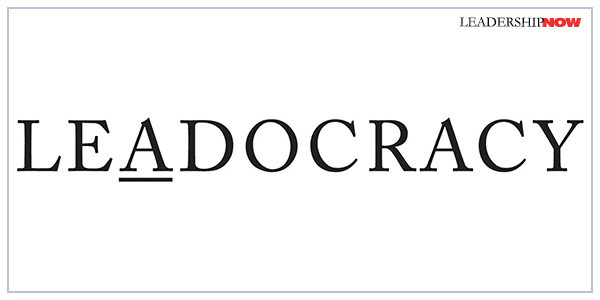 |
 |
06.25.12

Leadocracy
RECENT POLLS reveal that most of us – 88% – think that government is broken. We lack confidence in the people who run for or serve in office. Geoff Smart says we have a who problem. In Leadocracy he writes that the only way to fix the what problems—the deficit, unemployment, and insufficient social services to name a few—is to get the right who into government. Smart finds that there is a huge untapped source of potential leaders in the private sector—if they would just step up. But they don’t—in droves—because of fear. Fear of not being able to make a difference, fear of the financial and psychological costs, and fear of public scrutiny. But they should for three reasons, says Smart. First, a leadership role in government is a new challenge and an opportunity to grow your leadership skills. Second, because you can make a difference, that is enormously satisfying. And third, in government, you interact with an amazing range of people—you build relationships, help them in ways only you can, and become part of a broader community that is making people’s lives better. Smart founded The Leaders Initiative with the goal of having 1500 private sector leaders complete a two-year stint in government (local, state, or federal) by 2030. The hope is that it will have a positive multiplier effect on encouraging more private sector leaders to consider “government leadership” in their career plan. Smart states, “Democracy works best when voters choose great candidates.” It seems like a simple statement, but it explains a lot. He says we are not very good at it. He does offer some tools and tips for determining how qualified a candidate is for the task at hand, and ensuring you are “hiring” the best leader for the job. He hopes we can reverse our tendency to: • place too much emphasis on likeability
I would agree with Smart. However, I would add that government isn’t broken because, in most cases, its leaders lack ideas, are bad people, bad leaders, stupid, incompetent, or just a bunch of amateurs. It’s broken because they are in a system that rewards them for pandering to their constituents. It’s how many of them keep their jobs. It would be a mistake to think that somehow government got all of the bad leaders and the private sector is hoarding them—and if we could flip-flop the situation, the problem would be solved. It’s a systemic problem. We see leaders in government that should know better, giving people what they want not because it is the best option for their constituents but because they want the votes to keep them in office. They effectively stop leading. We do have a who problem. But realistically it is not just a matter of getting the “good people” in. It will take a tremendous amount of fortitude for anyone wishing to serve in government to take the time to educate instead of pander, to do the hard things rather than the expedient, to lead rather than follow, to stand on character instead of popularity. But then, we would probably vote them out. So the issue is something we have to remedy within ourselves too. It’s also an issue the Founding Fathers didn’t think we should take lightly. 
Posted by Michael McKinney at 12:11 AM
|
BUILD YOUR KNOWLEDGE
 

How to Do Your Start-Up Right STRAIGHT TALK FOR START-UPS 
Grow Your Leadership Skills NEW AND UPCOMING LEADERSHIP BOOKS 
Leadership Minute BITE-SIZE CONCEPTS YOU CAN CHEW ON 
Classic Leadership Books BOOKS TO READ BEFORE YOU LEAD |